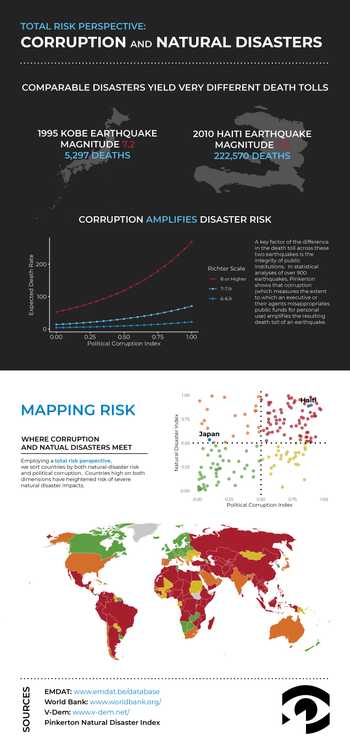
In January of 1995, the Great Hanshin Earthquake struck Kobe, Japan. Registering 7.2 on the Richter scale, it was Japan’s worst earthquake since 1923. Over 400,000 buildings were severely damaged and 5,297 people died.
In January 2010, a magnitude-7.0 earthquake struck Haiti. This time, over 280,000 structures were severely damaged, while the estimated death toll was 222,570 over forty times the death toll in Kobe.
How can two earthquakes of similar magnitude yield death tolls with a disparity of over 200,000 lives?
Is corruption a factor in natural disaster response?
A few obvious factors account for a portion of the difference. One is the difference in economic development between Haiti and Japan. Japan has a highly developed economy, with more robust infrastructure, and more resources available to allocate towards rescue and recovery. Haiti, in contrast, is a much poorer nation.
In statistical analyses of over 900 earthquakes, Pinkerton identifies another important factor: corruption. Analyses show that political corruption amplifies the resulting death toll of an earthquake.
In exploring the relationship between corruption and natural disasters, Pinkerton made use of reports by V-dem, an international organization that evaluates democracy quality of a government. V-dem collects data on the electoral, liberal, participatory, deliberative, and egalitarian aspects of a governments rule of law. They define corruption as when an executive or their agents takes bribes or kickbacks, or steal, embezzle, or otherwise misappropriate public funds or other state resources for personal or family use.
Proper zoning, building construction, and disaster relief funds are all susceptible to mismanagement and misappropriation. This type of corruption results in both a deterioration of public institutions and propagation of lower quality building stock, which in turn results in more severe outcomes following a natural disaster.
A tangled relationship between corruption and natural disasters
The relationship between corruption and natural disasters is entangled. While existing corruption can exacerbate the consequences of a natural disaster, the influx of disaster relief funds also creates new opportunities for governmental corruption and social unrest. This relationship can destabilize and drastically change the welfare of a population center hit by a disaster. The recent example of Hurricane Maria exemplifies how a natural disaster can generate social and political unrest.
Case in point: Hurricane Maria in Puerto Rico
Hurricane Maria struck the American territory of Puerto Rico in September of 2017. The associated death toll was initially placed at 64 deaths but was raised to a staggering 2,975 after a series of studies conducted by the Milken Institute School of Public Health. It took over 300 days to fully restore electricity to the island (though it remains unstable with rolling blackouts to this day). Delays in restoration of the power grid and distribution of potable water throughout the island resulted in many additional (and arguably preventable) deaths.
Hurricane Maria and the governmental response dealt a staggering blow to the economy of Puerto Rico, which has a poverty rate of 44.9%. Earlier this year the government reported that there were still 300,000 homes on the island with blue tarps for roofs.
The consequences of Hurricane Maria for Puerto Rico have been myriad. A poorly coordinated response to the initial storm, as well as an incomplete and ineffective application of relief funds, has fueled widespread protests and resulted in the resignation of the Governor and several other government officials.
Issues of trust and confidence in authority and government are impacted by natural disasters. The trend of worsening natural disasters on a global scale suggests that unstable nations will face amplified consequences. Countries with a high coincidence of natural disaster risk and political corruption are in a troubling feedback loop where each disaster can exacerbate political instability and corruption which results in worse outcomes following future disasters.
Sources
- Ascertainment of the Estimated Excess Mortality from Hurricane Maria in Puerto Rico Milken Institute School of Public Health 2018
- Kahn, Matthew E. The death toll from natural disasters: the role of income, geography, and institutions. Review of economics and statistics 87.2 (2005): 271-284.
- EMDAT: www.emdat.be/database
- Pinkerton Natural Disaster Index
- V- Dem: www.v-dem.net/
- https://www.nytimes.com/2019/07/10/us/puerto-rico-corruption.html?module=inline
- https://www.nytimes.com/2019/07/15/us/puerto-rico-protests-rossello-governor.html




